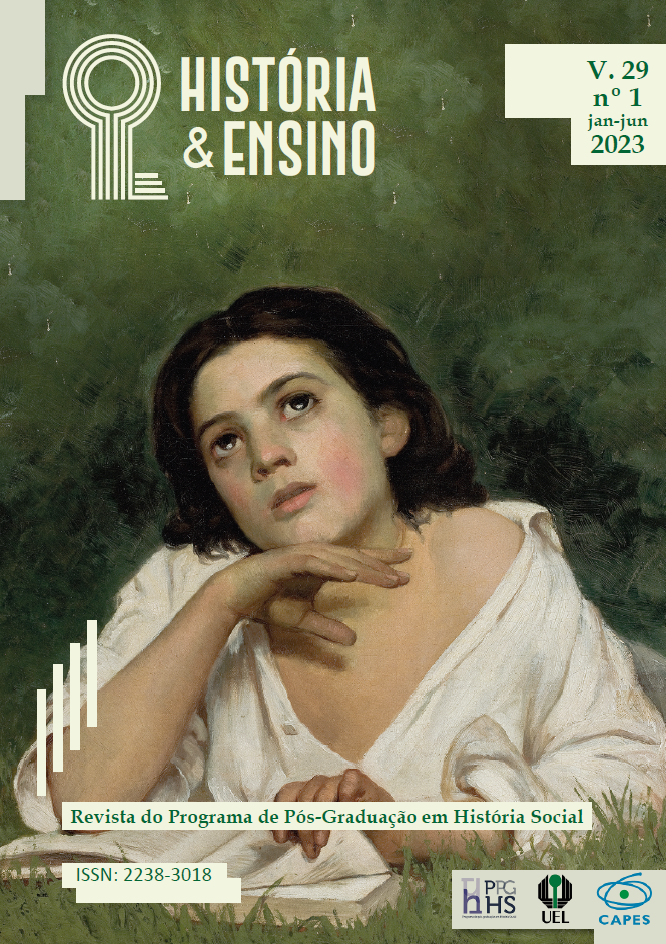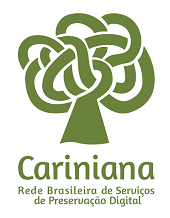Sobre pensar historicamente e o desafio da educação histórica
DOI:
https://doi.org/10.5433/2238-3018.2023v29n1p010-029Palavras-chave:
Educação histórica, pensamento histórico, historicidade, hermenêutica, conhecimento disciplinarResumo
Nos últimos anos, a noção de pensamento histórico tem se tornado popular em pesquisas sobre educação histórica, particularmente na América do Norte, no Reino Unido e na Austrália. O objetivo deste artigo é discutir as competências cognitivas relacionadas ao pensamento histórico como uma noção de história educacional a partir de dois aspectos, conforme defendido por alguns influentes pesquisadores canadenses: o que é o pensamento histórico e o que ele significa em um contexto educacional? Quais são as consequências do pensamento histórico para a educação histórica? Nossa discussão centrar-se-á nas possíveis implicações desta abordagem para o Ensino de História no que diz respeito ao que deve ser ensinado nas salas de aula de História e seus porquês. Ao centrar-nos na noção de historicidade, argumentamos que, embora seja bem-vindo um enfoque de abordagem mais disciplinar para o Ensino de História, pensamos que deveria ser dada maior atenção no que poderia ser qualificado como uma abordagem disciplinar. Argumentamos ainda que o pensamento histórico e o desafio da educação histórica devem ser compreendidos como mais amplos e
complexos do que implica a educação histórica embasada no pensamento histórico.
Downloads
Referências
ARENDT, Hannah. Lectures on Kant's political philosophy. Chicago: University of Chicago Press, 1982. DOI: https://doi.org/10.7208/chicago/9780226231785.001.0001
ARENDT, Hanna. The human condition. 2. ed. Chicago: University of Chicago Press, 1998.
BIESTA, Gert. Good education in an age of measurement: On the need to reconnect with the question of purpose in education. Educational Assessment, Evaluation and Accountability, Dordrecht, v. 21, n. 1, p. 33-46, 2009. DOI: https://doi.org/10.1007/s11092-008-9064-9. DOI: https://doi.org/10.1007/s11092-008-9064-9
CARROLL, James Edward. Epistemic explanations for divergent evolution in discourses regarding students' extended historical writing in England. Journal of Curriculum Studies, Basingstoke, v. 51, n. 1, p. 100-120, 2019. DOI: https://doi.org/10.1080/00220272.2018.1499805. DOI: https://doi.org/10.1080/00220272.2018.1499805
CLARK, Jennifer; NYE, Adele. 'Surprise Me!' The (im)possibilities of agency and creativity within the standards framework of history education. Educational Philosophy and Theory, Randwick, v. 49, n. 6, p. 656-668, 2017. DOI: https://doi.org/10.1080/00131857.2015.1104231. DOI: https://doi.org/10.1080/00131857.2015.1104231
CLARK, Penney; SEARS, Alan. Fiction, history and pedagogy: a double-edged sword. Journal of Curriculum Studies, Basingstoke, v. 49, n. 5, p. 620-639, 2017. DOI: https://doi.org/10.1080/00220272.2016.1238108. DOI: https://doi.org/10.1080/00220272.2016.1238108
DONNELLY, Mark; NORTON, Claire. In the service of technocratic managerialism? History in UK Universities. Educational Philosophy and Theory, Randwick, v. 49, n. 6, p. 643-655, 2017. DOI: https://doi.org/10.1080/00131857.2015.1104232. DOI: https://doi.org/10.1080/00131857.2015.1104232
FORDHAM, Michael. Tradition, authority and disciplinary practice in history education. Educational Philosophy and Theory, Randwick, v. 49, n. 6, p. 631-642, 2017. DOI: https://doi.org/10.1080/00131857.2015.1135777. DOI: https://doi.org/10.1080/00131857.2015.1135777
GADAMER, Hans-Georg; FANTEL, Hans. The problem of historical consciousness. Graduate Faculty Philosophy Journal, [New York], v. 5, n. 1, p. 8-52, 1975. DOI: https://doi.org/10.5840/gfpj1975512. DOI: https://doi.org/10.5840/gfpj1975512
GADAMER, Hans-George. Reply to my critics. In: ORMISTON, Gaile L.; SCHRIFT, Alan D. (ed.). The hermeneutic tradition: from Ast to Ricoeur. Nova York: State University of New York Press, 1990. p. 273-297.
GADAMER, Hans-George. Truth and method. 2. ed. Nova York: Continuum, 2006.
HARRIS, Richard; GRAHAM, Suzanne. Engaging with curriculum reform: Insights from English history teachers' willingness to support curriculum change. Journal of Curriculum Studies, Basingstoke, v. 51, n. 1, p. 43-61, 2019. DOI: https://doi.org/10.1080/00220272.2018.1513570. DOI: https://doi.org/10.1080/00220272.2018.1513570
HAWKEY, Kate. A new look at big history. Journal of Curriculum Studies, Basingstoke, v. 46, n. 2, p. 163-179, 2014. DOI: https://doi.org/10.1080/00220272.2013.778331. DOI: https://doi.org/10.1080/00220272.2013.778331
HAWKEY, Kate; PRIOR, Jayne. History, memory cultures and meaning in the classroom. Journal of Curriculum Studies, Basingstoke, v. 43, n. 2, p. 231-247, 2011. DOI: https://doi.org/10.1080/00220272.2010.516022. DOI: https://doi.org/10.1080/00220272.2010.516022
HONIG, Michal; PORAT, Dan. Reading biographical texts: A gateway to historical disciplinary reading. Journal of Curriculum Studies, Basingstoke, v. 51, n. 5, p. 1-24, 2019. DOI: https://doi.org/10.1080/00220272.2019.1567821. DOI: https://doi.org/10.1080/00220272.2019.1567821
LEE, P. J. History Teaching and Philosophy of History. History and Theory, Middletown, v. 22, n. 4, p. 19-49, Dec. 1983. DOI: https://doi.org/10.2307/2505214. DOI: https://doi.org/10.2307/2505214
LÉVESQUE, Stephane. Thinking historically: educating students for the twenty-first century. Toronto: Buffalo, 2008.
LÉVESQUE, Stephane; CLARK, Penney. Historical thinking: definitions and educational applications. In: METZGER, Scott Alan; HARRIS, Lauren McArthur (Ed.). The Wiley international handbook of history teaching and learning. Hoboken: John Wiley & Sons, Inc., 2018. p. 119-148. DOI: https://doi.org/10.1002/9781119100812.ch5
LEVISOHN, Jon A. Historical thinking - and its alleged unnaturalness. Educational Philosophy and Theory, Randwick, v. 49, n. 6, p. 618-630, 2017. DOI: https://doi.org/10.1080/00131857.2015.1101364. DOI: https://doi.org/10.1080/00131857.2015.1101364
MONTE-SANO, Chauncey; COCHRAN, Melissa. Attention to learners, subject, or teaching: What takes precedence as preservice candidates learn to teach historical thinking and reading? Theory & Research in Social Education, [s. l.], v. 37, n. 1, p. 101-135, 2009. DOI: https://doi.org/10.1080/00933104.2009.10473389. DOI: https://doi.org/10.1080/00933104.2009.10473389
PARKES, Robert J. Developing your approach to history teaching. In: ALLENDER, Tim; CLARK, Anna; PARKES, Robert. (ed.). Historical thinking for history teachers: a new approach to engaging students and developing historical consciousness. Crows Nest: Allen & Unwin, 2019. p. 72-88. DOI: https://doi.org/10.4324/9781003115977-8
PERSSON, Anders. Lärartillvaro och historieundervisning: innebörder av ett nytt uppdrag i de mätbara resultatens tid. UmeÃ¥: UmeÃ¥ universitet, 2017.
PERSSON, Anders; THORP, Robert. Historieundervisningens existentialiserande potential. Nordidactica: Journal of Humanities and Social Science Education, [s. l.], n. 2, p. 59-74, 2017.
PORAT, Dan A. It's not written here, but this is what happened: Students'
cultural comprehension of textbook narratives on the Israeli-Arab Conflict. American Educational Research Journal, Washington, v. 41, n. 4, p. 963-996, 2004. DOI: https://doi.org/10.3102/00028312041004963. DOI: https://doi.org/10.3102/00028312041004963
RETZ, Tyson. At the interface: academic history, school history and the philosophy of history. Journal of Curriculum Studies, Basingstoke, v. 48, n. 4, p. 503-517, 2016. DOI: https://doi.org/10.1080/00220272.2015.1114151. DOI: https://doi.org/10.1080/00220272.2015.1114151
RETZ, Tyson. The Structure of historical inquiry. Educational Philosophy and Theory, Randwick, v. 49, n. 6, p. 606-617, 2017. DOI: https://doi.org/10.1080/00131857.2015.1101365. DOI: https://doi.org/10.1080/00131857.2015.1101365
RÜSEN, Jörn. Forming historical consciousness - Towards a humanistic history didactics. In: NORDGREN, Kenneth; ELIASSON, Per; RÖNNQVIST, Carina (ed). The processes of history teaching: an international symposium held at Malmö University, Sweden, March 5th-7th 2009. Karlstad: Karlstadts Universitet, 2011. p. 15-33.
SEGALL, Avner. Critical history: implications for history/social studies education. Theory & Research in Social Education, [S. l.], v. 27, n. 3, p. 358-374, 1999. DOI: https://doi.org/10.1080/00933104.1999.10505885. DOI: https://doi.org/10.1080/00933104.1999.10505885
SEIXAS, Peter. A model of historical thinking. Educational Philosophy and Theory, Randwick, v. 49, n. 6, p.593-605, 2017. DOI: https://doi.org/10.1080/00131857.2015.1101363. DOI: https://doi.org/10.1080/00131857.2015.1101363
SEIXAS, Peter; MORTON, Tom. The big six: historical thinking concepts. Toronto: Nelson Education, 2013.
SEIXAS, Peter; PECK, Carla. Teaching historical thinking. In: SEARS, Alan; WRIGHT, Ian. (ed.). Challenges & prospects for Canadian social studies. Vancouver: Pacific Educational Press, 2004. p. 109-117.
SHEMILT, Denis. Drinking an ocean and pissing a cupful: how adolescents make sense of history. In: SYMCOX, Linda; WILSCHUT, Arie (ed.). National history standards: the problem of the canon and the future of teaching history. Charlotte: Information Age Pub, 2009. p. 141-210.
THORP, Robert. Uses of history in history education. Umeå: Umeå universitet, 2016.
THORP, Robert. History didactical entanglements and the Cold War: a comparative study of the opening lessons on the Cold War in Sweden and Switzerland. In: CHRISTOPHE, Barbara; GAUTSCHI, Peter; THORP, Robert. (ed.). The cold war in the classroom: international perspectives on textbooks and memory practices. New York: Palgrave
Macmillan, 2019.
VANSLEDRIGHT, Bruce A. The challenge of rethinking history education: on practices, theories, and policy. New York: Taylor & Francis Group, 2010. DOI: https://doi.org/10.4324/9780203844847
WILSCHUT, Arie. Images of time the role of an historical consciousness of time in learning history. Charlotte: Information Age Pub, 2012.
WINEBURG, Sam. Historical thinking and other unnatural acts: charting the future of teaching the past. Filadélfia: Temple University Press, 2001.
YOUNG, Michael. Overcoming the crisis in curriculum studies: a knowledge based approach. Journal of Curriculum Studies, Basingdtoke, v. 45, n. 2, p. 101-118, 2013. DOI: https://doi.org/10.1080/00220272.2013.764505. DOI: https://doi.org/10.1080/00220272.2013.764505
Downloads
Publicado
Como Citar
Edição
Seção
Licença
Copyright (c) 2023 Robert Thorp, Anders Persson

Este trabalho está licenciado sob uma licença Creative Commons Attribution 4.0 International License.
História & Ensino adota a licença CC-BY esta licença permite que os reutilizadores distribuam, remixem, adaptem e criem a partir do material em qualquer meio ou formato, desde que a atribuição seja dada ao criador. A licença permite o uso comercial.























